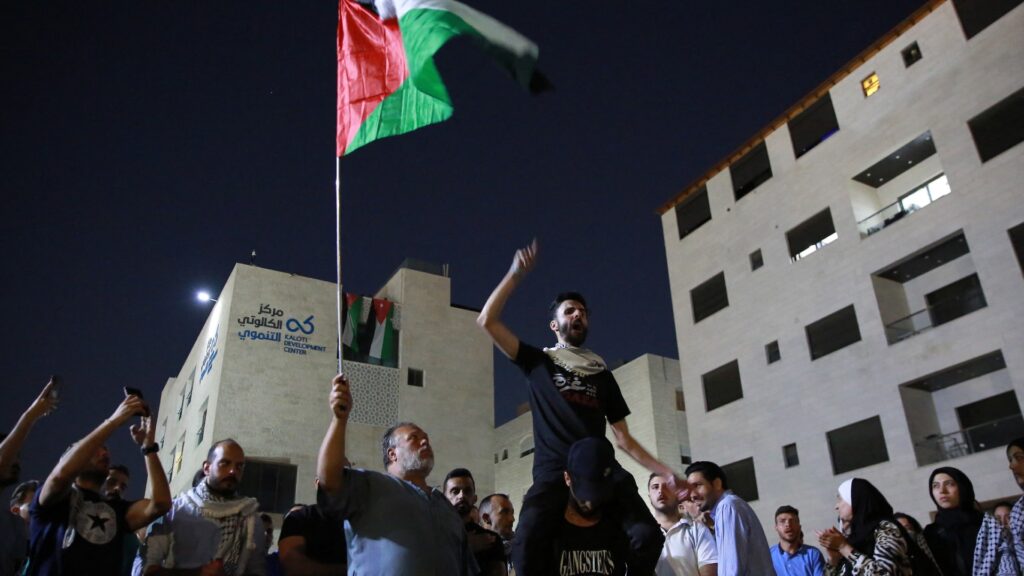Jordanian authorities are inadvertently fuelling an “internal crisis” with their decision to crack down on Palestine solidarity activists, sources have told Middle East Eye.
The sources said that the situation was reaching a boiling point due to Jordan’s intelligence services launching a heavy-handed campaign of arrests targeting activists, political opponents and party leaders.
The arrests come amid mounting instability in neighbouring Syria, worsening conditions for Palestinians in the occupied West Bank and Israel pursuing a campaign of genocide by starvation in Gaza.
On Wednesday, Jordanian authorities arrested the prominent social media activist Ayman Aballi, days after he published a video denouncing what he called the country’s “silence” over Israel’s starvation policy in Gaza.
Criticism of the intelligence services, commonly known as the Mukhabarat, was already escalating after a young man died in police custody a day after his arrest, the sources told MEE.
New MEE newsletter: Jerusalem Dispatch
Sign up to get the latest insights and analysis on
Israel-Palestine, alongside Turkey Unpacked and other MEE newsletters
Local media reported that tensions began to escalate after Ahmed al-Ibrahim died in police custody after being subject to a “severe physical assault” during detention.
According to his family, Ibrahim was taken to a nearby hospital on multiple occasions while at the Ramtha police station in Ar-Ramtha, 5km from the Syrian border.
He reportedly succumbed to his injuries hours after being transferred to the hospital for the final time.
His death triggered a night of anger in Ar-Ramtha, with videos seen by MEE showing angry protesters blocking roads, setting tyres on fire and demanding full accountability.

Jordan targeting Gaza solidarity in largest arrest campaign in decades
Read More »
On the same day that Ibrahim died, security forces arrested Yanal Freihat, an MP from the Islamic Action Front (IAF) party, over a Facebook post in which he criticised the government’s stance on the Muslim Brotherhood.
Security forces also briefly detained Muslim Brotherhood spokesman Moaz al-Khawaldeh, before releasing him the following day.
“The security forces are creating an internal crisis and causing an unprecedented wave of anger in the streets,” a Jordanian political analyst told MEE on condition of anonymity, due to fear of reprisals.
“This comes at a time when Jordan is facing serious external threats that require internal unity, not deep political and societal divisions.
“Jordan now faces two major, unprecedented strategic threats. The first is the threat of the collapse of the Syrian state and the secession of Sweida with Israeli support, possibly sparking a widespread civil war that would impact the region and Jordan,” the analyst said.
“The second is the threat of the displacement of Palestinians from the West Bank to Jordan, leading to a change in the demographic composition of the Hashemite kingdom.”
Jordan needs internal stability
One of the sources MEE spoke to emphasised that in both cases, Jordan needed internal stability to confront these threats.
Neighbouring Syria has been beset with another round of deadly sectarian clashes, with Israel seeking to exploit the vacuum in the war-torn state.
The violence was reportedly triggered by a petty crime on 11 July, when a Bedouin gang allegedly robbed and then kidnapped a Druze merchant. This prompted a series of tit-for-tat sectarian kidnappings and killings.
When Syrian security forces entered the province to restore order, they were ambushed by Druze fighters.

Jordan forcibly evicting Bedul Bedouins in Petra, says Human Rights Watch
Read More »
Reports that the Druze fighters executed government forces and killed women and children caused widespread outrage. As Syria’s government deployed more troops, including tanks and heavy weapons, Israel began attacking them and military positions across the country.
The source said that amid the wave of arrests, the security services were being attacked for cracking down on Jordanian civil society while “turning a blind eye to the real threat posed by Israeli activity in the region”.
In April, a Jordanian opposition website claimed that the government had launched a widespread arrest campaign against activists, in addition to its decision to target the Muslim Brotherhood.
It claimed that this was reportedly in response to demands from Saudi Arabia and the United Arab Emirates (UAE) and aimed at obtaining financial aid from both countries.
Earlier this month, tribesmen from the city of Tafilah gathered and organised a sit-in near the intelligence headquarters in Amman, to demand the release of 72-year-old Ahmed al-Zarqan, a former mayor of the southern Jordanian city.
Zarqan is the deputy general supervisor of the Muslim Brotherhood, which was recently banned in the Hashemite kingdom.
Security forces arrested him in late April. To date, Zarqan has not been charged, referred to court, or allowed to contact a lawyer. His family has not been allowed to visit him.
Anger grows over 1994 ‘normalisation’
As the situation in Gaza deteriorates, Jordanian authorities have faced unprecedented criticism over Amman’s diplomatic relations with Israel.
The two countries normalised relations in 1994 and are known to cooperate on numerous regional security issues.
Massive protests have erupted over the 1994 accord and the genocidal war on Gaza, where at least 58,000 Palestinians have been killed, most of them civilians.
Anger has also been steadily rising over Israel’s occupation of the West Bank and the mounting civilian death toll.
Jordan has a lengthy and complicated relationship with the West Bank, after occupying the area and East Jerusalem in 1948, before annexing them in 1950.
Jordan offered citizenship to the Palestinians living there, including refugees, and ruled the West Bank until losing it to Israel during the 1967 war.
Although the West Bank had been formally incorporated inside the kingdom, the 1950 annexation agreement decreed Jordanian rule a temporary arrangement, to be held in trust until a final resolution was found for the Palestinian issue.
Following the 1967 war, Israel encouraged Jews to settle in the West Bank, providing land, military protection, electricity, water and roads. Some Israeli Jews justify settlement on religious grounds, but many Israelis consider control of the territory necessary to prevent Palestinians from attacking Israel.

